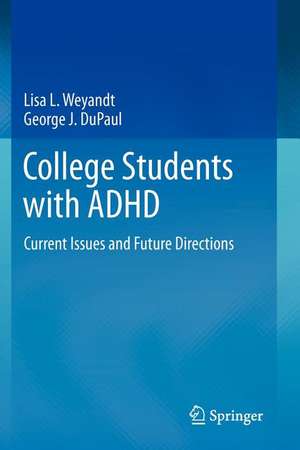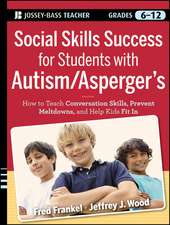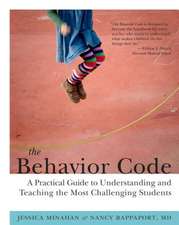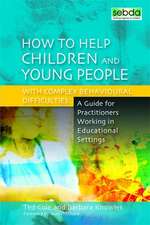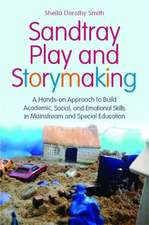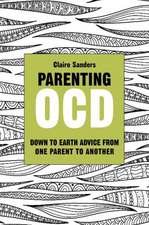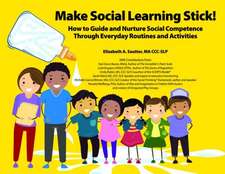College Students with ADHD: Current Issues and Future Directions
Autor Lisa L. Weyandt, George J. DuPaulen Limba Engleză Paperback – 29 oct 2012
College Students with ADHD is designed to bring the professional reader up to speed. The book reviews the latest findings on ADHD in high school and college students, assessment methods, and pharmacological and nonpharmacological interventions. Practical guidelines are included for helping young adults make the transition to college, so they may cope with their disorder and do as well as possible in school and social settings. Coverage is straightforward, realistic, and geared toward optimum functioning and outcomes. Among the topics featured:
- Background information, from current statistics to diagnostic issues.
- ADHD in high school adolescents.
- ADHD in college students: behavioral, academic, and psychosocial functioning.
- Assessment of ADHD in college students.
- Psychosocial/educational treatment of ADHD in college students.
- Pharmacotherapy for college students with ADHD.
- Future directions for practice and research.
The comprehensive information in College Students with ADHD provides a wealth of information to researchers and professionals working with this population, including clinical and school psychologists, school and college counselors, special education teachers, social workers, developmental psychologists, and disability support staff on college campuses, as well as allied mental health providers.
Preț: 491.58 lei
Preț vechi: 578.33 lei
-15% Nou
Puncte Express: 737
Preț estimativ în valută:
94.07€ • 97.66$ • 78.44£
94.07€ • 97.66$ • 78.44£
Carte tipărită la comandă
Livrare economică 22 martie-05 aprilie
Preluare comenzi: 021 569.72.76
Specificații
ISBN-13: 9781461453444
ISBN-10: 1461453445
Pagini: 138
Ilustrații: XIII, 122 p. 7 illus.
Dimensiuni: 155 x 235 x 12 mm
Greutate: 0.2 kg
Ediția:2012
Editura: Springer
Colecția Springer
Locul publicării:New York, NY, United States
ISBN-10: 1461453445
Pagini: 138
Ilustrații: XIII, 122 p. 7 illus.
Dimensiuni: 155 x 235 x 12 mm
Greutate: 0.2 kg
Ediția:2012
Editura: Springer
Colecția Springer
Locul publicării:New York, NY, United States
Public țintă
Professional/practitionerCuprins
Acknowledgments.- Preface.- Chapter 1: Introduction and Background Information.- Chapter 2: ADHD in Adolescents (Middle and High School).- Chapter 3: Academic, Social, and Psychological Functioning.- Chapter 4: Assessment of ADHD.- Chapter 5: Psychosocial Treatment and Educational Interventions.- Chapter 6: Pharmacotherapy.- Chapter 7: Future Directions for Practice and Research.
Recenzii
From the reviews:
“By providing a critical review and analysis of the research on college students with ADHD, College Students With ADHD is a major contribution to the literature. It will be enlightening to researchers and those working to help this student population. … This book clearly serves as a benchmark for the field of study that centers on college students, but it could also serve as a model for similar publications that focus in turn on preschool children, school children, and adults with ADHD.” (Robert D. Brown, PsycCRITIQUES, Vol. 58 (45), November, 2013)
“By providing a critical review and analysis of the research on college students with ADHD, College Students With ADHD is a major contribution to the literature. It will be enlightening to researchers and those working to help this student population. … This book clearly serves as a benchmark for the field of study that centers on college students, but it could also serve as a model for similar publications that focus in turn on preschool children, school children, and adults with ADHD.” (Robert D. Brown, PsycCRITIQUES, Vol. 58 (45), November, 2013)
Notă biografică
Lisa L. Weyandt, Ph.D., is Professor of Psychology at the University of Rhode Island. She is recognized nationally and internationally for her work with ADHD and executive functions. Dr. Weyandt is particularly interested in the assessment and treatment of ADHD in college students including pharmacological and nonpharmacological interventions, and clinical neuroscience. She is the author of An ADHD Primer and The Physiological Bases of Cognitive and Behavior Disorders and has published numerous articles and book chapters concerning ADHD.
George J. DuPaul, Ph.D., is Professor of School Psychology and Chairperson of the Department of Education and Human Services at Lehigh University. He has extensive experience providing clinical services to children and adolescents with Attention Deficit Hyperactivity Disorder (ADHD) and their families as well as consulting with a variety of school districts regarding the management of students with ADHD. He has been an author or co-author on more than 180 journal articles and book chapters related to ADHD. He has published seven books and two videos on the assessment and treatment of ADHD. Currently, he is investigating the effects of early intervention and school-based interventions for students with ADHD as well as the assessment and treatment of college students with ADHD.
George J. DuPaul, Ph.D., is Professor of School Psychology and Chairperson of the Department of Education and Human Services at Lehigh University. He has extensive experience providing clinical services to children and adolescents with Attention Deficit Hyperactivity Disorder (ADHD) and their families as well as consulting with a variety of school districts regarding the management of students with ADHD. He has been an author or co-author on more than 180 journal articles and book chapters related to ADHD. He has published seven books and two videos on the assessment and treatment of ADHD. Currently, he is investigating the effects of early intervention and school-based interventions for students with ADHD as well as the assessment and treatment of college students with ADHD.
Textul de pe ultima copertă
Not long ago, conventional wisdom held that ADHD was a disorder of childhood only—that somewhere during puberty or adolescence, the child would outgrow it. Now we know better: the majority of children with the disorder continue to display symptoms throughout adolescence and into adulthood. It is during the teen and young adult years that the psychological and academic needs of young people with ADHD change considerably, and clinical and campus professionals are not always sufficiently prepared to meet the challenge.
College Students with ADHD is designed to bring the professional reader up to speed. The book reviews the latest findings on ADHD in high school and college students, assessment methods, and pharmacological and nonpharmacological interventions. Practical guidelines are included for helping young adults make the transition to college, so they may cope with their disorder and do as well as possible in school and social settings. Coverage is straightforward, realistic, and geared toward optimum functioning and outcomes. Among the topics featured:
College Students with ADHD is designed to bring the professional reader up to speed. The book reviews the latest findings on ADHD in high school and college students, assessment methods, and pharmacological and nonpharmacological interventions. Practical guidelines are included for helping young adults make the transition to college, so they may cope with their disorder and do as well as possible in school and social settings. Coverage is straightforward, realistic, and geared toward optimum functioning and outcomes. Among the topics featured:
- Background information, from current statistics to diagnostic issues.
- ADHD in high school adolescents.
- ADHD in college students: behavioral, academic, and psychosocial functioning.
- Assessment of ADHD in college students.
- Psychosocial/educational treatment of ADHD in college students.
- Pharmacotherapy for college students with ADHD.
- Future directions for practice and research.
Caracteristici
Based on empirical evidence and exclusively targets college students with ADHD Helps mental health practitioners better identify and treat ADHD and assist those diagnosed with the disorder to cope most effectively Translates research into practice Not only summarizes what is currently known about ADHD in college students but also articulate important directions for future research and clinical efforts
